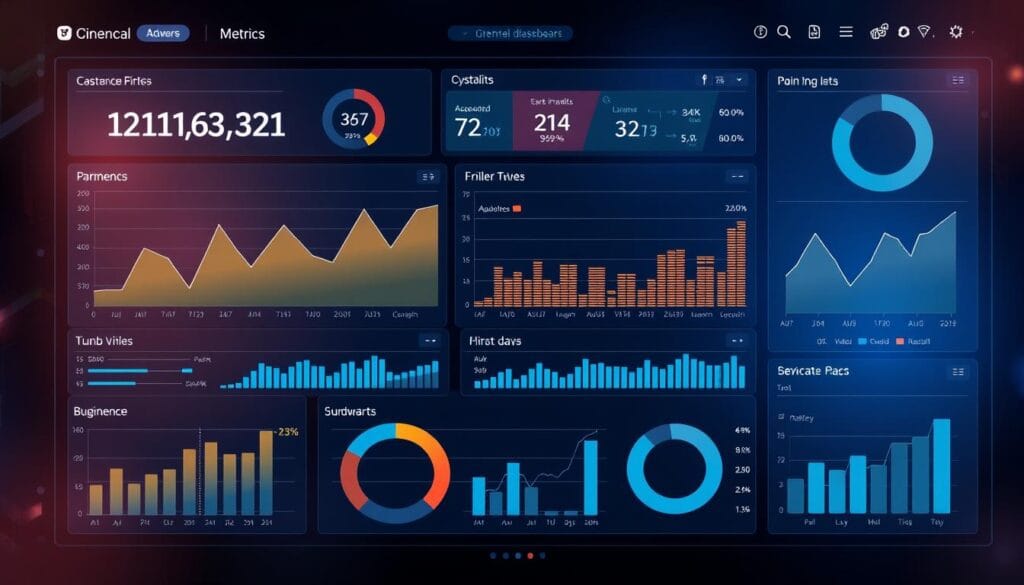The financial landscape is undergoing a significant transformation, driven by technological advancements and changing investor expectations. According to a 2022 report by Deloitte, automated investment advice platforms are growing at a compound annual growth rate (CAGR) of nearly 27%, signaling a robust adoption across client segments.
This shift is particularly relevant for millennial investors who are seeking personalized and accessible financial services. As the wealth management industry continues to evolve, AI-powered solutions are emerging as game-changers, offering sophisticated predictive analytics and data-driven financial planning.
Key Takeaways
- The wealth management industry is being reshaped by technological advancements and evolving investor expectations.
- AI-powered wealth management solutions offer personalized and accessible financial services for millennials.
- By 2025, AI wealth management is projected to become mainstream, offering unprecedented opportunities for millennials to build and manage their wealth.
- The integration of AI in wealth management represents a paradigm shift from traditional advisory models to data-driven financial planning.
- Millennials can leverage AI-powered tools to make informed investment decisions and secure their financial future.
The Evolution of Wealth Management in the Digital Age

Wealth management is undergoing a significant shift, driven by technological advancements and changing investor expectations. This transformation is particularly evident in the way different generations interact with financial services.
Shifting Demographics and Changing Investor Expectations
The tolerance for AI in financial services varies significantly across different generations. According to a recent Prosper Insights & Analytics survey, 44% of Baby Boomers do not trust AI to have their best interest in mind, compared to only 21% of Gen-Z. This disparity highlights the growing acceptance of AI among younger investors, which is expected to accelerate the adoption of automated financial services.
As demographics shift, investor expectations are evolving. Millennials, in particular, are driving demand for more flexible, digitally accessible financial planning solutions that align with their personal values and life goals.
The Millennial Approach to Financial Planning
Millennials approach financial planning differently than previous generations, prioritizing flexibility, digital accessibility, and alignment with personal values. They seek financial solutions that offer transparency in fees and investment strategies, preferring straightforward explanations over complex financial jargon. As noted by industry experts, “The millennial generation is more likely to embrace AI-powered financial tools, with research showing significantly higher trust in AI among younger investors compared to Baby Boomers.”
For more information on how millennials can plan their retirement using robo-advisors, visit Plan Your Retirement with the Best Robo-Advisors of. Their comfort with technology translates to higher adoption rates of robo-advisors and AI-powered financial planning tools that offer convenience and personalization.
AI Wealth Management for Millennials 2025: Market Overview

AI is revolutionizing the wealth management sector by providing personalized investment insights and real-time data analysis. As millennials continue to drive demand for sophisticated financial services, the integration of AI technologies is becoming increasingly critical.
The current market landscape is characterized by a significant shift towards AI-driven solutions. To understand the trajectory of this trend, it’s essential to examine the current adoption rates and growth projections.
Current Adoption Rates and Growth Projections
The adoption of AI in wealth management is gaining momentum, driven by the need for more efficient and personalized financial services. According to recent trends, the growth rate of AI adoption in this sector is expected to be substantial, with a significant increase in the number of firms leveraging AI for data analysis and investment strategies.
As wealthtech platforms continue to evolve, they are expected to play a crucial role in shaping the future of wealth management. The increasing demand for real-time insights and the ability to analyze vast amounts of data are key factors driving this growth.
Key Drivers Accelerating AI Integration in Finance
Several key factors are driving the acceleration of AI integration in finance and wealth management. These include the increasing complexity of financial markets, growing demand for personalized investment strategies, and the need for advanced data analysis capabilities.
The abundance of data and improved computational capabilities have made sophisticated AI applications not just possible but necessary for competitive advantage. Regulatory pressures and compliance requirements are also pushing firms to adopt AI solutions that can efficiently monitor and ensure adherence to complex financial regulations.
Furthermore, client expectations for real-time insights and personalized advice are compelling wealth management firms to implement AI technologies. The competitive pressure from fintech startups is forcing traditional firms to accelerate their AI adoption to remain relevant.
Core AI Technologies Transforming Millennial Investing
Core AI technologies are at the forefront of transforming millennial investment strategies. These technologies are not only enhancing the efficiency of financial services but also personalizing the investment experience for millennials.
Automated Advisory and Portfolio Management
Automated advisory services are revolutionizing wealth management by providing personalized investment advice without human intervention. AI-driven portfolio management systems can analyze vast amounts of data to optimize investment portfolios, ensuring they are aligned with the client’s financial goals and risk tolerance.
Predictive Analytics and Market Trend Forecasting
Predictive analytics is another critical AI technology transforming millennial investing. By analyzing historical data and market trends, AI systems can forecast future market movements, enabling investors to make informed decisions. This capability is particularly valuable for millennials who are looking to grow their wealth over time.
Hyper-Personalization Through Machine Learning
Hyper-personalization represents the next frontier in wealth management, using machine learning to create truly individualized financial experiences. By analyzing hundreds of data points about each client, AI-powered systems can develop bespoke investment strategies tailored to each millennial investor’s unique circumstances and goals.
The integration of these AI technologies is driving a significant shift in how millennials approach investing, making it more personalized, efficient, and aligned with their individual needs.
Leading AI Wealth Management Platforms for Millennials
With the rise of fintech, millennials now have access to a variety of AI-powered wealth management tools tailored to their needs. These platforms offer a range of services from investment management to budget optimization, leveraging AI to provide personalized financial solutions.
All-in-One Financial Management Solutions
Millennials are benefiting from all-in-one financial management platforms that integrate various financial services. Platforms like AI-driven financial solutions offer comprehensive financial oversight, enabling users to manage their finances efficiently. These platforms analyze income and expenses, provide investment advice, and offer budgeting tools.

Investment-Focused AI Assistants
AI investment assistants are gaining popularity among millennials for their ability to provide data-driven investment advice. These platforms use predictive analytics to forecast market trends, helping millennials make informed investment decisions. By automating investment management, they offer a hassle-free way to grow wealth.

Budget Optimization and Debt Management Tools
AI-powered budget optimization and debt management tools are addressing critical financial challenges faced by millennials. Platforms like Albert and Trim analyze spending patterns, identify saving opportunities, and automatically optimize budgets. They can detect unnecessary expenses and even negotiate bills on behalf of users, making them invaluable for millennials seeking to reduce costs and build wealth.

Benefits and Challenges of AI-Driven Wealth Management
AI-driven wealth management is revolutionizing the way millennials approach financial planning. As the financial landscape evolves, understanding the advantages and limitations of AI-driven solutions becomes crucial.
Advantages for Millennial Investors
Millennial investors benefit significantly from AI-driven wealth management. Cost Efficiency and Accessibility are key advantages, as AI platforms often reduce management fees and minimum investment requirements, making wealth management more inclusive.
Cost Efficiency and Accessibility
AI-driven platforms provide cost-effective solutions, allowing millennials to manage their finances efficiently. By leveraging automation, these platforms reduce the need for human intervention, thereby decreasing costs.
Data-Driven Decision Making
AI systems enable data-driven decision making, providing millennials with insights based on vast amounts of market data. This helps in making informed investment decisions.
Potential Concerns and Limitations
Despite the benefits, there are concerns regarding AI-driven wealth management. Data Privacy and Security Issues are paramount, as AI systems handle sensitive client information.
Data Privacy and Security Issues
The use of AI in wealth management raises concerns about data privacy and security. Ensuring the protection of client data is crucial for the success of AI-driven platforms.
The Human Element in Financial Advice
The human element remains vital in financial advice, particularly for complex situations. Millennials often prefer hybrid models that combine AI analysis with human guidance, especially during significant life transitions.
For more insights on AI in finance, visit AI Money Matters Blog. The most successful wealth management approaches for millennials will likely combine AI’s analytical power with human advisors’ emotional intelligence and contextual understanding.
Conclusion: The Future of Millennial Wealth Building with AI
By 2025, AI-driven wealth management will have become an indispensable tool for millennials seeking to optimize their financial planning and wealth growth. As AI technologies continue to evolve, they will enable more sophisticated financial planning capabilities, including scenario modeling that adapts to changing life circumstances and market conditions.
The millennial generation’s comfort with technology will drive continued adoption and innovation in AI wealth management solutions. For a comprehensive understanding of how AI is transforming wealth management, you can explore our in-depth analysis on robo-advisor performance reviews. As assets managed through AI platforms are projected to grow substantially, the industry is poised for significant growth and shifts in markets.

